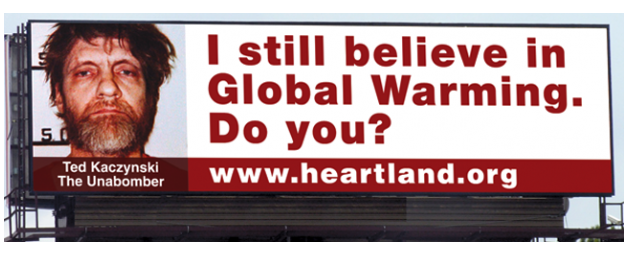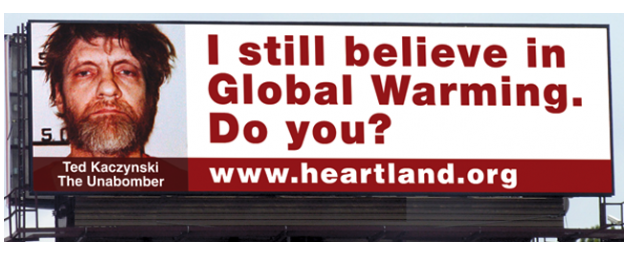
After a year fraught with hardship, the climate-denialist Heartland Institute is being rapidly abandoned by its friends and supporters, doomed to wind up friendless and alone, wandering the streets clad only in rags, hawking matches to indifferent passers-by. It would be straight-up Dickensian if they weren’t such jerks. But most of this ill will is coming from the organization’s over-the-line billboard campaign comparing climate scientists and other global warming believers to legendary mass murderers.
The organization has lost at least $825,000 in donations — 35 percent of its projected corporate funding — and has been forced to publicly take coal industry money in order to keep afloat. It’s hemorrhaging staff, speakers, and support as well.
Its entire Washington DC office, barring one staffer, decamped, taking Heartland’s biggest project, involving the insurance industry, with them.
Board directors quit, conference speakers cancelled at short-notice, and associates of long standing demanded Heartland remove their names from its website. The list of conference sponsors shrank by nearly half from 2010, and many of those listed sponsors are just websites operating on the rightwing fringe.
Heartland, or anyway the fragile husk of conspiracy theories and bile that is all that remains of the once-proud-if-deluded organization, is unchastened by the revelation that everyone hates its guts now. Heartland President Joseph Bast insists that the billboards were “factual,” which I suppose is true for very limited definitions of “factual” — for example, Ted Kaczynski was a real person, he was really called the Unabomber, he really believed in global warming, and global warming is really a thing. It’s just the entire fucking POINT of the billboard that’s grossly fallacious and borderline libel. Apparently Bast was and is counting on Heartland supporters having such shallow logical and moral convictions that they wouldn’t care. But he bet wrong.



